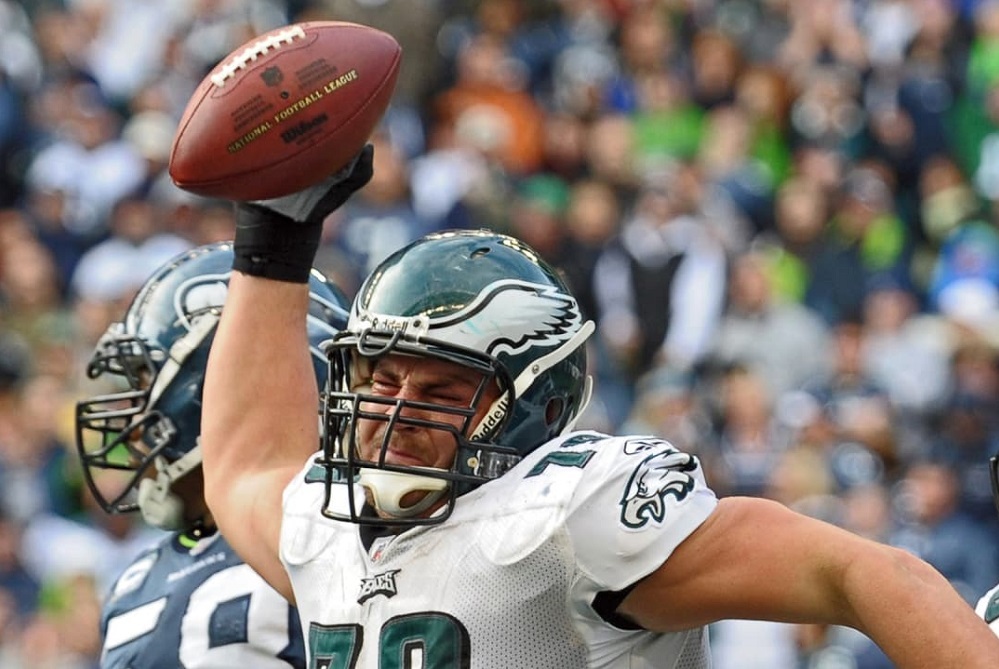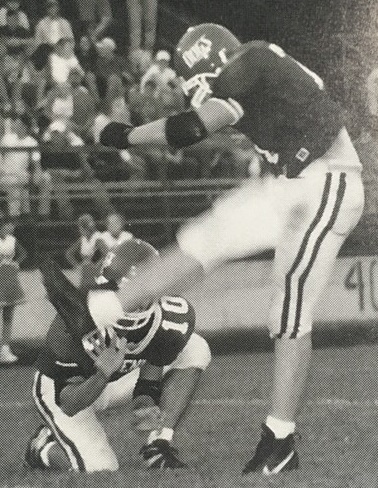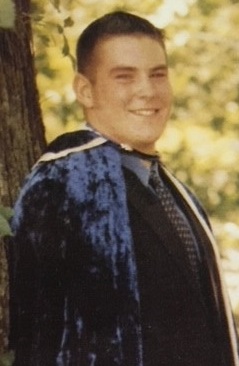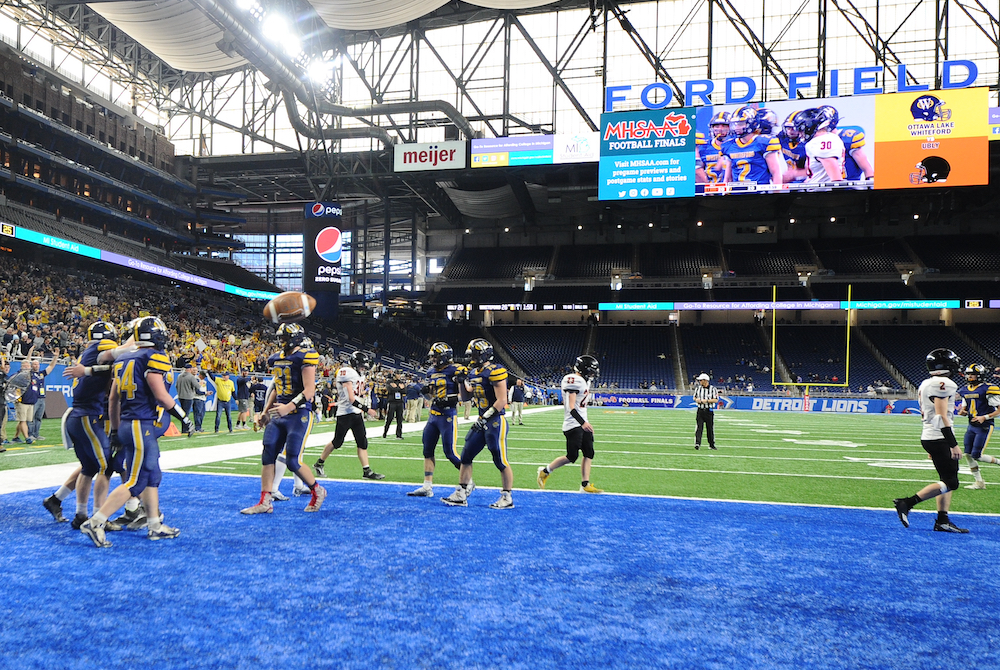
Herremans' Focus on 'Dadding,' Giving Kids Similar Small-Town Childhood
By
Tom Kendra
Special for MHSAA.com
August 5, 2021
Todd Herremans played 11 seasons in the NFL, battling big-name defensive linemen every Sunday and ascending to celebrity status in Philadelphia.
 But make no mistake: He’s still a small-town, Ravenna boy at heart.
But make no mistake: He’s still a small-town, Ravenna boy at heart.
“We lived in downtown Philly for the last 10 years and then the kids came along,” said Herremans, a 2001 graduate of Ravenna High School. “I tried to make it work, but one day it just hit me that I have no idea how to raise kids in the city.”
So, in a scene straight out of the 1960’s television comedy “Green Acres,” in January he loaded up his wife, Elizabeth, daughter Olivia (5) and son Jaxon (3) and moved to a farm in West Chester, a small town about 50 miles east of Philadelphia.
One of the goals of the move has been to provide his kids with a childhood something like his idyllic upbringing in Ravenna, a rural village in eastern Muskegon County with about 1,200 residents.
Herremans’ father, Paul, is approaching his 31st season as the varsity baseball coach at Ravenna, despite retiring as a math teacher in 2010. He has also coached football and basketball at Ravenna since the 1970s and, as a result, his sons John, Scott and Todd basically grew up under the bleachers.
“I remember being really little and I couldn’t wait to be old enough to be the bat boy,” said Todd Herremans, now 38, whose mother, Marilee, was also a teacher. “Then once I did that, I was itching to put on the pads and the uniforms. Then I couldn’t wait to be on the varsity.”
 He grew up to be a four-sport athlete at Ravenna – starring in football, basketball and baseball (along with helping out the track & field team in his senior year, throwing the discus and shot put) – and he credits playing multiple sports for helping him not only make it to the NFL, but to stay there for 11 years and remain healthy enough to start 126 of 135 career games.
He grew up to be a four-sport athlete at Ravenna – starring in football, basketball and baseball (along with helping out the track & field team in his senior year, throwing the discus and shot put) – and he credits playing multiple sports for helping him not only make it to the NFL, but to stay there for 11 years and remain healthy enough to start 126 of 135 career games.
“There’s no doubt playing other sports helped me make it to the NFL – the footwork I developed playing basketball and things like that,” said Herremans. “But it really helped me stay there. When you play different sports you are in different scenarios and fill different roles on each team. I think I was more adaptable than some of the other guys I played with.”
Herremans earned all-West Michigan Conference honors in football, basketball and baseball at Ravenna, but he was a late bloomer in many ways as his skill set grew into his big frame.
He went on to start for four years at Saginaw Valley State, playing in 48 games and starting 40 of them at left or right offensive tackle. During his senior year at Saginaw Valley he earned first-team Little All-America honors from The Associated Press, which put him firmly on the NFL radar.
He was selected in the fourth round of the 2005 NFL Draft, when the Eagles traded up to take him with Green Bay’s pick (126th overall). He started his first NFL game Nov. 27, 2005, and remained a fixture on the Eagles’ offensive front for the next decade.
Herremans, who played at 6-foot-6 and 323 pounds, was known for his consistency and durability, as well as his versatility – playing every interior line position for the Eagles except for center.
The versatility didn’t stop there, however, as he is one of the few interior offensive linemen in NFL history to catch two touchdown passes, one each in 2008 and 2010.


After being released by the Eagles in 2015, he was picked up right away by Indianapolis, where he started two games.
These days, Herremans spends much of his time taking care of his children at the farm in West Chester and also at his cottage on Torch Lake in northern Michigan.
“I do a lot of dadding,” he said with a laugh.
Since his retirement, Herremans and a partner started BodyChek Wellness, a company that makes hemp-based products to help with wellness, balance and recovery. He is also a member of Athletes for Care, a group that advocates for athletes on various issues of health and safety, including the use of cannabis as medicine.
He looks forward to the summer months, when he spends most of his days at his northern Michigan cottage, allowing him a perfect place and opportunity to catch up with his family and friends from both Ravenna and Saginaw Valley.
Even better is having time to watch his kids grow up, which he said would have been nearly impossible during his NFL playing days.
“I have a lot of fun being with them,” Herremans said. “Ever since we moved out to the country, my son has been obsessed with tractors and tools. I love that.”
2020-21 Made in Michigan
July 29: Loy Norrix Career Prepped Crocker for U-M Success, Law Degree Pursuit - Read
July 19: Top PGA Pro Finish Latest Greatest Highlight as Cook Continues Climb - Read
July 16: TC West Standout Renews Ties to Titans, Cheers Past Teammates' Gold Pursuit - Read
July 8: Caro Champs Find Common Ground Again as Mental Health Providers - Read
June 28: Michigan's Minor Leaguers Making Up for Lost Season - Read
PHOTOS: (Top) Past Ravenna standout Todd Herremans, here with the Philadelphia Eagles, spikes after scoring in 2008. (Middle) Herremans with wife Elizabeth and children Olivia and Jaxon. (Below) Todd’s high school memories include kicking field goals and earning the Homecoming crown. (Top photo courtesy of the Philadelphia Eagles; middle photo courtesy of the Herremans family; below photos courtesy of Ravenna High School.)

Set, Ready, Challenge: 11-Player Football Finals Challenges New in 2022
By
Jon Ross
MHSAA Director of Broadcast Properties
November 25, 2022
New this year at the MHSAA 11-Player Football Finals is the opportunity for head coaches to challenge a call.
In previous years, all potential scoring plays and potential turnovers were automatically reviewed. That process will continue and now, under a limited set of circumstances, the head coach can challenge calls.
To do so, the head coach must first call a timeout. If a team has no timeouts remaining, they are not able to challenge a call. Challenges must be presented to the officials immediately after the timeout is granted. If the challenge is successful, the team will get its timeout back and have the ability to challenge one more call during regulation. A second successful challenge will not result in the ability to challenge a third call.
The following plays are reviewable by challenge:
- Complete/incomplete passes
- Runner/receiver in/out of bounds
- Runner ruled not down
- Forward progress spot as it relates to the yard to gain
- First touching of a kick
- Recovery of a ball in/out of bounds
- Forward/backward pass
- Penalties called on the field only for:
- Illegal forward pass
- Targeting or illegal helmet contact
- Pass interference only as it relates to the pass being previously tipped
NOTE: All other penalties called on the field are not reviewable. These include, but are not limited to: illegal formation, ineligible receivers downfield, illegal participation, illegal substitution or delay of game. If a penalty is not called by the officials on the field, the play can never be reviewed to retroactively call a penalty.
In overtime, challenges – like timeouts – reset. Each team has the ability to challenge one call for the entirety of overtime, but must have a timeout to use to do so. A successful challenge in overtime will not result in the ability to challenge a second call.
If a play is overturned in regulation or overtime, the replay officials will correct all aspects of the play including time, position of the ball and whether the clock will be started on the RFP or snap. The game clock or play clock may be reviewed only as it directly relates to the overturning of a call on the field.
There is no change to the review of potential scoring and potential turnover plays. Those plays are automatically looked at by the replay official and replay assistant. If the replay official can confirm the ruling on the field without stopping play, the official will do so. If more time is needed to review the play, the on-field referee will announce that and then will announce the replay official’s decision. For a play to be reversed, there must be indisputable video evidence that shows the original call was incorrect. Every attempt will be made to complete the review process in 90 seconds or less.
The addition of the coach’s challenge was approved by the MHSAA’s Representative Council at its May 2022 meeting.

